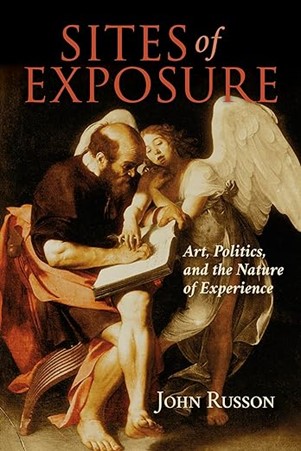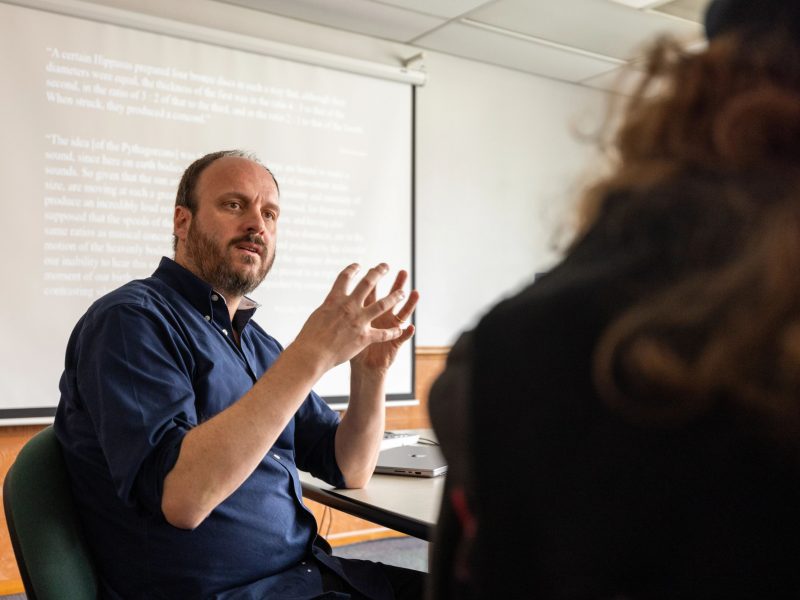An Exploration of John Russon’s Phenomenology with Dr. Gregory Kirk
Professor Gregory Kirk, the associate chair of the Philosophy Department, recently contributed to the Fall 2023 volume of Symposium: Canadian Journal of Continental Philosophy with an article titled “Russon’s Method of Authorless Description” (pp. 108–133). The piece is part of a special section within the journal entitled “John Russon’s Phenomenological Encounters.” Symposium, a bilingual Canadian journal that publishes in both French and English, features six responses to various aspects of John Russon’s work.

Cover of Aristotle on Human Nature: The Animal with Logos (2023) by Gregory Kirk and Joseph Arel
Russon, a distinguished professor of Philosophy at the University of Guelph, stands at the forefront of the study of phenomenology. Russon describes phenomenology as “the description of experience in the terms in which it is lived rather than in the terms we impose upon it because of our theories about the nature of reality.”[1] Phenomenologists notice that what we take to be our immediate experience of the world is actually deeply informed by what we might call the “theoretical baggage” of our family, our culture, and our place in history. The hiddenness of this baggage gives us the mistaken impression that what we “immediately” experience is simply how the world is. But this is not the case. The devout Catholic living in Medieval Europe experienced themselves and all other living things as creatures created by God. By contrast, the post-Darwinian person perhaps experienced themselves as a product of evolution and their world as an extended assortment of accidents in the unfolding of inert matter with an external source of motion. In each case, the person experiences the world “transparently” according to their culture’s given interpretation, their theoretical baggage, meaning that there are several layers of assertions about the nature of reality embedded in how they “immediately” experience it that they are not typically conscious of.
In light of the inevitable theoretical baggage we bring to our experience of the world, phenomenology attempts what Edmund Husserl calls a “bracketing” of the attitude that underlies how we normally interpret the world, in favor of aspiring to a description with the minimum amount of interpretation possible. In doing so, the phenomenological method allows us to discover things about the nature of experience that were previously, so to speak, hiding in plain view. Phenomenology has been used to gain better insight into the nature of human experience, the foundations of our normative judgments, the experience of embodiment, and the experience of interpersonal life. As the discipline has developed, it has been applied to the study of the particular experiences of feminine embodiment, racialized embodiment, incarceration, and many others. John Russon has applied phenomenology to a wide range of areas, such as mental health in his book Human Experience: Philosophy, Neurosis, and the Elements of Everyday Life (2003), to human sexuality in Bearing Witness to Epiphany: Persons, Things, and the Nature of Erotic Life (2009), and to the demands associated with mature adulthood in the modern world in Adult Life: Aging, Responsibility, and the Pursuit of Happiness (2020).
Dr. Kirk’s article aims to present John Russon’s original contributions to phenomenology, particularly his method of authorless description. It also highlights the influences of Aristotle, Hegel, and Heidegger on Russon’s method and provides valuable insights into a Hegelian interpretation of 21st-century life. Kirk asserts that “Russon’s method provides essential tools for understanding the promises and failures of what we call the modern world and the imperative of openness that ought to guide us in striving to address those failures.” He applies his thesis to Russon’s book, Sites of Exposure: Art, Politics, and the Nature of Experience (2017). Dr. Kirk has considerable expertise in the major figures of Phenomenological and Existential Philosophical Tradition and German Idealism, as well as John Dewey’s contributions to the field. He is interested in their emphasis on the role that interpersonal and social dynamics play in the formation of human experience and our perception of reality. Much of Kirk’s research is oriented around the question, “What is a good life?” and what psychological, interpersonal, social, and political conditions contribute to the accomplishment of a good life.
Previous publications by Dr. Kirk include his book The Pedagogy of Wisdom: An Interpretation of Plato’s Theaetetus (Northwestern University Press, 2015) and, more recently, the volume he co-edited with former NAU colleague Joseph Arel, Aristotle on Human Nature: The Animal with Logos (Bloomsbury Academic, 2023). He is currently working on an untitled book-length study of Aristotle’s Nicomachean Ethics. Over the years, Dr. Kirk has taught various courses at NAU, encompassing Ancient and Modern Philosophy, 19th and 20th Century Continental Philosophy, Existentialism, Freud, and Psychoanalysis, as well as Ethics (both theoretical and applied), and Metaphysics.
Full-text articles from Symposium are available through subscribed institutions via the Philosophy Documentation Center. Articles published more than one year ago are available for free at the Philosophy Documentation Center. NAU is not a subscribed institution; however, the abstract is available on Dr. Kirk’s PhilPapers profile.

Cover of Sites of Exposure by Dr. John Russon, University of Guelph
References
[1] John Russon, “The Virtues of Agency: A Phenomenology of Confidence, Courage, and Creativity,” in Phenomenology and Virtue Ethics, (ed.) Kevin Hermberg and Paul Gyllenhammer (Bloomsbury Publishing, 2013) 165.
